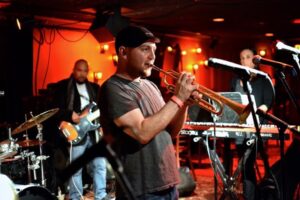by The Cowl Editor on September 28, 2017
Arts & Entertainment

by Patrick Fuller ’21
A&E Staff
Recently, I sat down with Alex Lee-Clark, a new history of jazz professor at Providence College, to ask him a couple questions about his current projects. Although he teaches trumpet and directs the Funk Ensemble, his influence and expertise extends beyond the PC campus.
Aside from teaching at PC, he runs “Pop Up Music,” an organization that “uses live music and discussion to engage your team in the creative act of listening: the art of listening to yourself and others, of hearing the meaning behind music, and of creating cohesion and understanding,” according to the musician’s website.
Furthermore, Lee-Clark heads two bands: the ALC Funktet and the ALC 8tet, and co-leads the BT/ALC Big Band with Brian Thomas.
PF: Could you give a brief run-down pertaining to the type of material students learn in The History of Jazz course?
ALC: I would say I have two goals. I want to give a quality overview of the history of jazz and why it’s important, but also focus on who the important people are. I think these are American geniuses. They’ve so completely shaped music today. But the other part about the course is that I want to teach people to listen actively to jazz and, subsequently, to other music. I want this to be a thing where I create (diabolically) a legion of music listeners who, when they go to a concert or listen to their own music, they think with a larger percentage of their minds. Subsequently, I want to cultivate concert-goers.
PF: Why do you think it is important for students to learn about the history of jazz?
ALC: I think that the history of jazz is the history of popular music and the history of how we treat musicians now. Jazz is so deeply embedded in American culture that we don’t even think about it. I think that, if you’re a better listener to jazz, then you’re a better listener to the world. There’s no lyric to tell you what to feel. What you have to listen for is the intention that’s being expressed. Especially in the charged political climate of today, we don’t listen in a constructive manner. Not only listening, but waiting for your time to talk, is an important skill for humans.
PF: I know you yourself are in a handful of bands, could you just briefly explain the focus of each one?
ALC: The idea of being in a band is pretty rare. In any given year, I’ll play with like 20 different bands. I’m more of a guy in town. The Funktet is a collective, it’s five musicians I happen to play with that night. They could be anybody. The BT/ALC Band is a band with set members. That’s basically my main project. We play funk but we also follow the style of jazz in the sense that jazz is a verb. You decide what the rules are, and then you improvise. The 8tet is my more straight-ahead jazz outlet. That band is more of my personal laboratory.
PF: You also run an organization called “Pop Up Music.” How did this organization come to be, and do you have any memorable experiences with certain startups?
ALC: My business partner and friend Ben Whiting graduated from Berklee and started touring, playing weddings, etc. But he wasn’t happy, he didn’t enjoy it. Ben started working at this place called the Cambridge Innovation Center (CIC), which harbors start-ups of all different sizes. In that, he expanded his network and started inviting people to shows, which were very well received. Eventually, we did a concert at the Cambridge Innovation Center as a sort of talk/lecture hybrid. Surprisingly, people stayed, people bonded, which we weren’t used to. As for notable companies, they include the CIC and Mass Challenge, but we are always looking for more clients and more opportunities.
PF: What have been your top three musical influences as a trumpet player?
ALC: It’s hard to say because you really cherry-pick from everybody but definitely Miles Davis, Clifford Brown, and some classical composers. My other biggest trumpet influences are my teachers: Kim Dunnick from Ithaca College, Eric Berlin from UMass, and my composing teacher, Jeff Holmes.
PF: Finally, do you have anything to say that might convince students to take this course?
ALC: I would tell people to take the course because you learn a flavor of what was relevant in jazz’s day. The course to me is about the experience of listening and the experience of getting more out of the music you listen to now. It makes listening to music richer. It makes you hear with different ears and see with different eyes.
Comments are closed.
amazing article!! loved reading this!